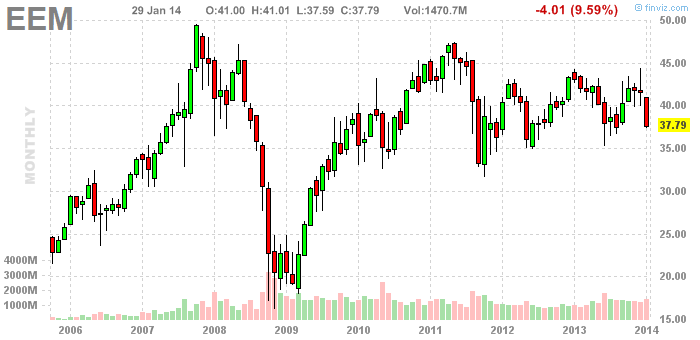As of this moment, S&P 500 was -1.02%, Nasdaq -1.14%, European indices were down between 0.5 and 1%, Nikkei -2.86% and our own Nifty -1.08% to 6054
Why? Because the US Fed said nothing about emerging markets yesterday when it decided to keep tapering its QE program.
Michael Casey on MoneyBeat:
Despite pleas from emerging-market authorities during last October’s International Monetary Fund meetings in Washington – calling on the Fed to take their interests into account when it began its tapering process – they were blatantly snubbed Wednesday. Do not be surprised if the initial, post-FOMC statement slide in emerging-market currencies morphs into another, bigger rout in the days ahead. Don’t be surprised, either, to see a backlash from governments in these countries, stoking international tensions and making everyone’s jobs at managing the current turmoil all the more difficult.
The current rout is evoking memories of September 1992, when the Bank of England hiked its official interest rate from 10% to 12% and then to 15% in a single, chaotic day as it attempted to maintain the British pound’s peg to the deutsche mark. Traders saw the hikes as desperate measures and continued to sell the pound. Pan to the present, and we see the same story play itself out in Turkey and South Africa.
Turkey’s central bank late Tuesday hiked its one-week repo rate to 10% from 4.5%, boosted its overnight lending rate to 12% from 7.75% and lifted its overnight borrowing rate to 8% from 3.5%. After a brief respite, the lira is back under pressure and has given up most of its gains.
South African attempts to halt the sharp depreciation of the currency backfired on Wednesday with the South African rand falling as much as 3% after the country’s reserve bank decided to increase interest rates for the first time in almost six years. The Rand is at its lowest against the US Dollar since October 2008. (FT)
The Russian ruble, once a darling commodity-based currency, now stands at its lowest level in five years and is the worst-performing currency in the world this year after the Argentine peso.
So what next?
The emergency moves will likely fail. Hedge funds control more capital than emerging market central banks combined. Plus, domestic politics will not allow central banks to indefinitely follow a tight-money policy. Take Turkey for example: the economy rebounded from recession in 2009 and experienced a boom that saw the economy expand nearly 9% in 2011 and 2010. Then, however, the Turkish economy slowed to 2.2% in 2012. Its a pretty hard fall to take and high interest rates will not help the recovery. Russia’s economy expanded by only 1.3% in 2013. They too cannot afford tight-money. And India? 5% growth is a starvation level event.
Sure, not all emerging markets are cut from the same cloth but when panic hits, investors typically pull the trigger first and ask questions later. Are emerging markets a bargain? The Emerging Markets Index is roughly where it was in 2010.

Could it get cheaper? Perhaps.
And what about India? Well, we had too much to drink (infrastructure debt binge, etc.) before the GFC and spent the rest of the next 5 years barely recovering (NPAs, capital raises, etc.) from the hangover. But it looks like we are going to get trampled by the herd again.
The best part is that this storm would have passed right in time for the new government to come in and take credit for the recovery.
